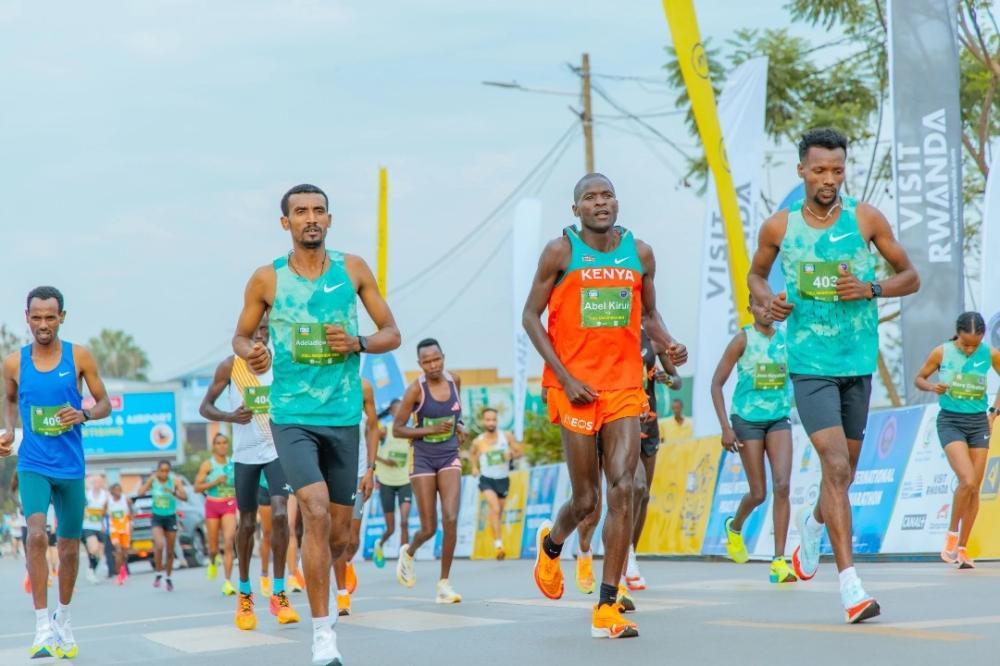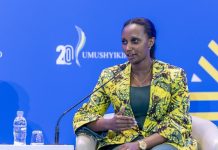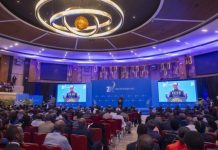Africa-Press – Rwanda. As Rwanda gears up for the 20th edition of the Kigali International Peace Marathon (KIPM) on June 8, the spotlight is firmly on the country’s efforts to position itself as a key hub for international sporting events.
With a history of promoting peace through sport, Rwanda has emerged as a stop for international athletes, hosting big events like the Tour du Rwanda, the Basketball Africa League (BAL), and the ATP Challenger Tour.
However, while Rwanda’s sports calendar grows more vibrant with each passing year, one area remains noticeably underdeveloped; local athletics.
Once upon a time, athletics was a key and prominent feature on the local sports calendar, but now? It’s more of a fringe sport than anything. How did we get here? Incompetency.
The KIPM is one of the most important fixtures in the country’s sporting calendar. It is a World Athletics Label Road Race and a member of the Association of International Marathons and Distance Races.
Launched in 2005, the Kigali Marathon not only celebrates the resilience and unity of the Rwandan people but also attracts thousands of international athletes, boosting the country’s profile on the global stage.
But despite this progress, one glaring issue persists; Rwanda has yet to produce a winner in the Main Race (full marathon) category, either among men or women.
Laban Kipngetich Korir is the defending champion (Men) of the annual race that has been dominated by Kenyan runners over the previous 19 editions. He won in 2:16:06.
The Marathon has seen Kenyan runners win all but only on three occasions; in 2005 (Ugandan Joseph Nsubuga), 2019 (Philip Kiprimo, Uganda) and 2021 (Ethiopian Derseh Kindie).
Joan Kipyatich (Kenya), 2:33:27, won last year’s women’s race. Similar to the men, Kenyan women have won 15 of the last 19 editions.
Ugandan Margaret Nakintu won the first edition, Banuelia Katesigwa of Tanzania triumphed in 2009, while Ethiopian Tigist Teshome took the 2013 gold medal and her compatriot Muluhabt Tsega claimed the 2023 gold.
Meanwhile, Paul Kosgei (Kenya) holds the men’s course record (2:14:56) set in 2012, while Kipyatich set the women’s record (2:33:27) on her way to last year’s title.
This underachievement for our athletes calls for a critical examination of the Rwanda Athletics Federation’s (RAF) strategy in developing local talent.
Rwandan athletes have been struggling to lead the podium at Kigali International Peace Marathon in recent years-courtesy
While Kenyan runners continue to dominate the marathon, and athletes from Ethiopia and Uganda occasionally rise to the occasion, the current state of Rwandan athletics leaves much to be desired.
Rwanda’s deliberate push to become a global sports hub is evident in hosting high-caliber events that have earned international recognition.
The KIPM has become one of Africa’s premier road races, with last edition attracting over 10,000 participants from 35 countries.
The event has helped position Rwanda as a tourism and sports destination, contributing to the country’s overall economic growth.
Rwanda’s strategic emphasis on sports has proven successful in other areas too.
The country’s hosting of the Tour du Rwanda cycling race has earned it a solid reputation in the cycling world, thus earning Rwanda the rights to host the 2025 UCI World Road Championships, scheduled for September 22-28,
The fact that the race is being hosted on the African continent for the first time, that alone pushes Rwanda to put on a show during this historic week of racing.
The country’s successful hosting of these events indicates that the it has the potential to rival other sports destinations across the globe.
However, this potential has not yet translated into significant success for local athletes, particularly athletics, for purposes of the column.
To make strides in this area, the federation (RAF) needs to re-evaluate its approach to nurturing homegrown talent. This we have said countless times, and it has become a boring song, but we shall not throw-in the towel just because our efforts haven’t had the desired effect
The absence of Rwandan athletes on the podium in major marathon events like our very own Kigali Peace Marathon, is a wake-up call for the country’s athletics body.
Despite Rwanda’s clear passion for running, and the KIPM being an event with deep cultural and historical significance, local talent has been unable to compete at the elite level.
Rwanda needs another Dieudonne Disi, Robert Kajuga, Mathias Ntawukuriryayo, or Epipanie Nyirabarame, Claudette Mukasakindi and Salome Nyirarukundo –the iconic athletes, who can compete at the world stage.
But how can this be achieved? The key lies in targeted, grassroots interventions and a comprehensive, long-term strategy.
One of the most pressing steps that the Rwanda’s athletics governing body must, and should have done so many years ago, was/is to introduce youth development programs at the grassroots level.
Imagine a situation where RAF had put together and implemented a proper 15-year development program, say, back in 2004, where would we be right now? Probably not at the very top, but at least our athletes would be competitive.
The marathon culture in Rwanda has the potential to grow, but only if young athletes are given the support, training, and encouragement they need to thrive. We have the best altitude for long distance.
Schools, local clubs, and community sports centers must be empowered to identify and develop running talent from a young age. Even the greats/best weren’t born so.
Also, while the country has experienced some success in other sports, athletics has lagged behind in terms of coaching standards.
A systematic approach to training coaches, including the recruitment of world-class mentors, would go a long way toward raising the bar.
Coaching clinics and exchange programs with athletics powerhouses could help bridge the gap between Rwanda and its neighbors, especially Kenya, Ethiopia, and Uganda, (lately), which have long dominated long-distance running.
Of course, to truly compete at an international level, Rwandan athletes need better facilities and resources. From running tracks to state-of-the-art gyms, proper infrastructure is essential to developing the full potential of (any) runners.
RAF, led by Rtd Lt. Col Lemuel Kayumba, need to collaborate with government bodies to ensure that facilities are accessible to young athletes across the country, not just those in urban centers.
Rwandan runners need to be given opportunities to compete in international competitions to gain exposure and experience.
While the KIPM is a fantastic platform, more opportunities for Rwandan athletes to race against top-level competitors is crucial to their development.
The government and RAF should explore ways to sponsor local athletes for professional training camps while participating in international marathons and races worldwide.
RAF, working hand-in-hand with local clubs, must instill a culture of athletic excellence. Long shot, I know, but worthy the investment.
Success breeds success, and creating a pipeline of young athletes, who can see role models achieving great things will inspire future generations to chase their dreams in the sport.
As Rwanda continues its ascent as a sports hub in Africa, there is no better time than now to invest in local athletics.
The KIPM is a symbol of the country’s peace-building efforts, but to truly make an impact on the international stage, Rwanda must focus on producing elite homegrown athletes.
RAF must rise to the occasion and ensure that local talent is nurtured, developed, and equipped to compete with the best.
We need to break the dominance of Kenya and Ethiopia in Rwanda’s premier marathon event and carve out a place for Rwandan runners among the world’s (semi)-elite.
The journey to success is a marathon, and no one is demanding quick success, yet every journey begins somewhere. Can RAF wake up front slumber, stand up and be counted?
For More News And Analysis About Rwanda Follow Africa-Press






